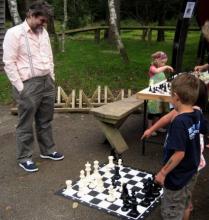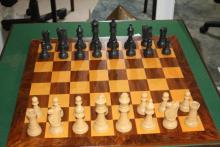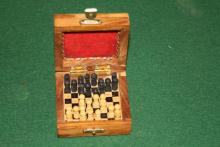Exeter Chess Club: 2 Open Games
From 200 Open Games by David Bronstein (DESCRIPTIVE)The games and stories are a joy.
THE SCOURGE OF CHAMPIONS
White: F. Duz-Khotimirsky
Moscow 1954, match 'Lokomotiv' v. 'Dinamo'
It is commonly thought that chess is a game for silent people. As soon as my opponent had played P-KB4 I suddenly heard an angry:
'And I'm having no refusal! Accept the sacrifice! If you don't take the pawn I won't continue the game!'
There was nothing I could do. I accepted the old maestro's gambit.
Several moves later Duz-Khotimirsky played a hurried move and, whilst I was considering my reply, decided ... to change his move.
The spectators gasped, the judges wanted to stop the clocks, but Fedor Ivanovich suddenly shouted at everyone:
'What on earth is this? Look, I made a bad move and now I'm changing it for a good one. Rules, you say? To hell with your rules, this is chess. Besides, you don't object?' said my opponent, turning to me.
'Please, it's my pleasure!'
And the game went on as if nothing had happened.
F.I. Duz-Khotimirsky defeated at the international Chigorin Memorial Tournament in St. Petersburg in 1909 both first prize-winners - the world champion and the champion of Russia, Lasker and Rubinstein.
In his game with Em. Lasker he conducted a K-side attack with exceptional accuracy, and in his game with A. Rubinstein he took over the initiative with a cunning pawn move and forced his opponent to make an unfavourable combination.
These successes earned the veteran fame with the chess public for many years, and he was called none other than 'the scourge of champions'.
1. e4 e5 2. f4 exf4 3. Nf3 g5 4. h4 g4 5. Ng5 {DIAGRAM}
|
THE THEORY OF MINOR MISTAKES
White: P. Trifunovic
Leningrad 1957, USSR v Yugoslavia
R. Fine expressed the view that a game would be lost in the last century after four mistakes, at the beginning of the present century only two, and in the middle of the 50's only one mistake would be needed.
This inevitably suggests the conclusion that we are approaching the time when it will be possible to lose a game without making a single mistake!
The famous Grandmaster-journalist S.G. Tartakover warned us, not against making mistakes in general, but against making the last mistake, as he was convinced that the person who makes the last mistake loses the game. I should like to develop his idea.
Avoid minor mistakes! Most often he loses who makes the first minor mistake because it signifies the beginning of an incorrect strategical plan.
A quiet opening, an early exchange of queens, a leisurely ... P-KN3 lulled Trifunovic's imagination to sleep and when he saw that the black-squared bishop wanted to occupy the great KR1-QR8 diagonal, instead of the usual K2 square, he thought: why should I castle K-side? And he castled Q-side.
Two more minor mistakes followed on this one. First the KRP advanced one square, to make room for the bishop on KB4, and then the white bishop took advantage of this haven.
Three minor mistakes probably equal one full mistake.
1. e4 e5 2. Nf3 Nf6 3. Nxe5 d6 4. Nf3 Nxe4 5. Qe2 Qe7 6. d3 Nf6 7. Bg5 Nbd7 8. Nc3 Qxe2+ 9. Bxe2 h6 10. Bf4 g6 11. O-O-O Bg7 12. h3 Nb6 13. Nd2 Nfd5 14. Nxd5 Nxd5 {DIAGRAM}
|



















































































